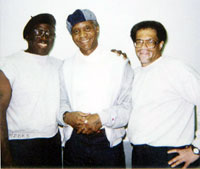Crack becomes faultline in Angola 3 case
By
Marina Drummer
Published Jul 2, 2005 9:04 AM
In the June 30 issue, Workers World reported
news of the Angola 3 case: that the 5th Circuit Court of Appeals ordered a lower
court to hear evidence about suppressed testimony during Herman Wal lace’s
trial for the murder of a guard in Louisiana State Penitentiary in Angola,
La.
|
Herman Wallace, Robert King Wilkerson
and Albert Woodfox.
|
Herman Wallace, Albert Woodfox and Robert King Wilkerson received more
good news in late June. All three men are plaintiffs in a lawsuit filed by the
American Civil Liberties Union. The lawsuit charges the Louisiana Department of
Corrections and the Angola Prison administration with the constitutional
violations of cruel and unusual punishment and lack of due process, in regard to
their over 33 years of solitary confinement in the hellhole of Angola
prison.
The lawsuit was so strong that it prompted U.S. Magistrate Docia
L. Dalby to write in her recent ruling, “The present matter, of course,
involves confinements of 28 to nearly 33 years, durations so far beyond the pale
that this Court has not found anything even remotely comparable in the annals of
American jurisprudence.” But the ACLU was unable to continue litigating
the case due to lack of resources. So the case had been inactive for the past
few months.
Now the law firm of Holland & Knight has agreed to
represent the Angola 3 in the civil lawsuit. George Kendall and Steve Hanlon
will assume the roles of lead counsels. They will work with Nick Trenticosta
serving as local counsel.
Kendall and Hanlon have a long history of
civil-rights litigation. They head up the firm’s Community Services Team.
A trial is anticipated for the end of this year.
In another important
development, the United States Supreme Court ruled in late June that prison
officials may not move an inmate into solitary confinement or lockdown without
first providing the prisoner with both fair notice of why the classification
might change and a chance to challenge the placement. This is a significant
ruling, because for many years the courts did not recognize that a prisoner has
a “liberty interest” in not being placed in severe living
conditions.
Now that the court has recognized this right, all rights to
due process and fundamental fairness must be provided. This ruling will greatly
help win the Angola 3 case.
For more information on the case, visit the
website www.angola3.org.
The writer is a leader of the National Coalition to Free the Angola 3.
Articles copyright 1995-2012 Workers World.
Verbatim copying and distribution of this entire article is permitted in any medium without royalty provided this notice is preserved.
Workers World, 55 W. 17 St., NY, NY 10011
Email:
[email protected]
Subscribe
[email protected]
Support independent news
DONATE


